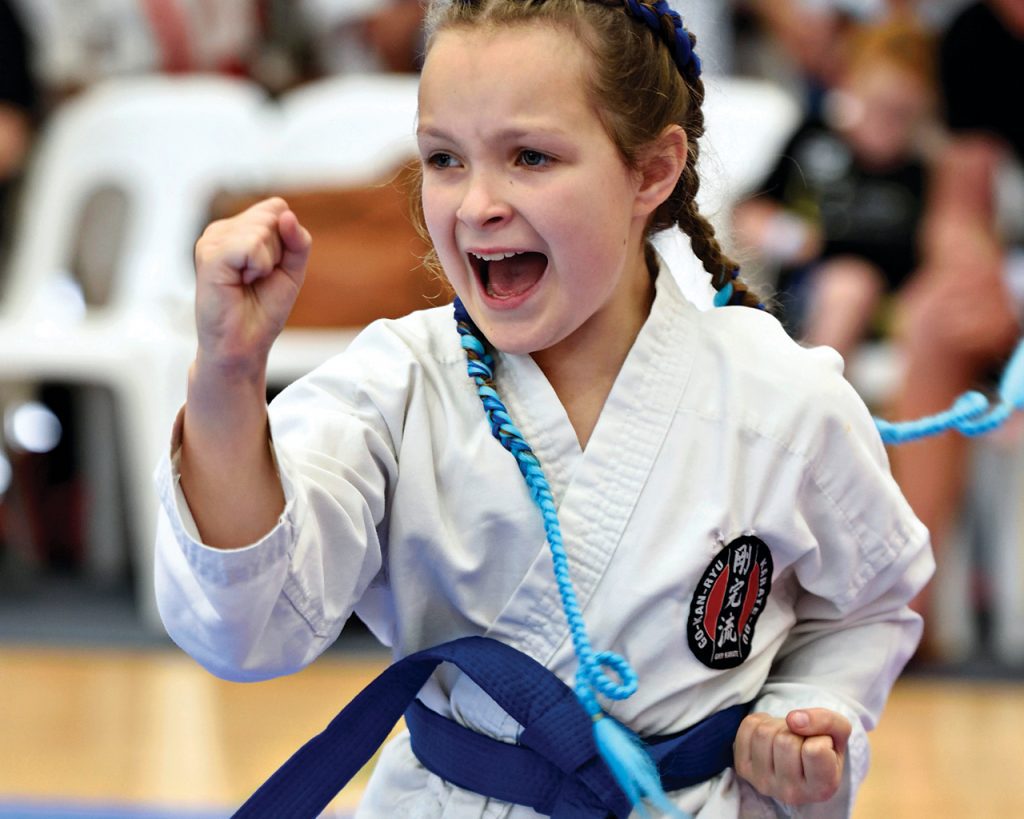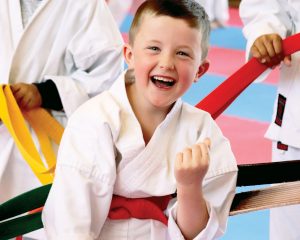
Parents play a crucial role in motivating children to explore new activities and serve as important role models in their lives. Participating in organised sports from a young age positively impacts children’s physical development as they learn various skills and movements.
As toddlers and children learn to roll, walk, talk, and develop hand-eye coordination, activities like kinder gym play a significant role in helping to develop these important skills. However, it is also important to note the unique benefits of martial arts in this critical stage of development.
Tailored to suit age and ability level, karate classes for toddlers and children feature engaging exercises, games, and drills that teach basic karate techniques. More than just physical skills, these classes imbue young learners with discipline, respect, and perseverance – skills that serve them well inside and outside of karate classes.
At GKR Karate, we have seen firsthand how martial arts training can enhance a child’s physical fitness across several dimensions – including cardiorespiratory fitness, speed, agility, strength, flexibility, coordination, and balance. Karate is not just about building skills; it’s about setting a foundation for a healthy, active life.
Improved Physical Fitness and Coordination
Karate is a martial art that can provide numerous benefits to toddlers and children. Regular karate practice can significantly improve a child’s physical fitness and coordination. Karate training involves exercises and techniques that target different muscle groups and promote flexibility, balance, and stamina.
During practise, students perform various movements such as kicks, punches, and blocks. Constantly repeating these movements helps to improve balance, coordination, and agility, which can help prevent falls and injuries.
Increased Focus and Discipline
Karate classes are an excellent environment for teaching children the values of hard work, perseverance, and self-discipline. As young children learn to pay attention and follow instructions in class, their ability to concentrate and adhere to directions significantly improves. This discipline extends beyond the class environment and instils a strong foundation for academic learning and everyday interactions. The structured nature of karate classes, where students must wait their turn, respect others’ space during exercises, and persist through challenging tasks, also helps to develop patience and impulse control.
Skills learned in karate classes positively impact future success in all areas of life, including in educational settings, social situations, and at home. By cultivating habits early, toddlers and children learn martial arts and gain a toolkit that fosters a disciplined and thoughtful approach to challenges they will encounter as they grow.
Self-Esteem and Confidence
Karate instructors are skilled in fostering a nurturing and supportive environment that champions each child’s progress and celebrates their achievements, big and small. This approach creates a sense of accomplishment and pride in the student’s abilities, bolstering their self-esteem and confidence each time they learn a new move, earn a new belt, or step outside their comfort zone.
Karate also improves confidence in physical skills, builds resilience, and prepares children to navigate challenges they may face with inner strength and determination. By providing positive reinforcement in class, instructors assist in building a solid base of self-worth that children will enjoy for years to come.
Click here to read in more detail how karate helps build self-confidence in children.

Partner Activities and Socialisation
Karate classes offer a structured and well-organised environment where toddlers and children can develop physically, socially, and emotionally. Engaging with peers through partner drills and practical self-defence scenarios increases students’ social skills and teaches them the virtues of cooperation, effective communication, and strategic problem-solving. These activities require students to listen, respond, and adapt to others while providing beneficial social interaction and teamwork opportunities.
Additionally, taking turns during class exercises requires patience and teaches the importance of respecting other people’s opportunities to learn and showcase their skills. This aspect of karate training helps young children understand the value of waiting and sharing space, which is essential for developing empathy and social etiquette. Combining structured physical and social interactions in karate classes supports holistic development, making toddlers and children better prepared to handle the complexities of social dynamics as they grow.
Self-Defence Skills
Self-defence is a vital component of any martial arts, it equips students with the confidence and age-appropriate skills to navigate difficult situations safely. Karate training fosters an understanding in children about controlling their actions and recognising their impact on others, cultivating a growing sense of respect and responsibility within the community. It also promotes situational awareness, teaching students to remain alert and cautious in different surroundings, which is imperative for personal safety. With regular practise, children can respond quickly and efficiently to different scenarios, significantly increasing their safety and well-being.
Cultural Education
Karate offers physical and cognitive benefits and provides a unique cultural education that enriches a child’s understanding of the world. As students learn karate, they learn more about Japanese customs, language and etiquette through using Japanese and English terminology in class and the reason behind karate’s customary bow.
Exposure to a new culture at a young age helps bring a sense of global awareness and respect for diversity to even the youngest minds. It encourages young learners to appreciate cultural differences; respect; self-discipline; and values central to karate’s philosophy.
Why Should My Child do Karate?
Karate offers many benefits for toddlers and children, encompassing physical, cognitive, and emotional development. Physically, it enhances their strength, flexibility, coordination, and balance, establishing a foundation for a healthy lifestyle. Cognitively, karate sharpens students’ focus, concentration, and decision-making skills, pivotal for future academic success and daily problem-solving. Emotionally, it builds confidence and self-esteem, teaching children the importance of perseverance, resilience, and self-discipline.
If you’re interested in karate for your toddler or child, we have exciting news. Our full-time centres offer Yoji classes for students aged 3 and above, specifically designed for young children eager to explore the world of martial arts. These classes help children develop skills in a fun and supportive environment. To find the nearest location offering Yoji classes, use the location finder on our website. Get ready to watch your little one embark on an exciting journey of growth, discipline and learning in a martial arts environment.



